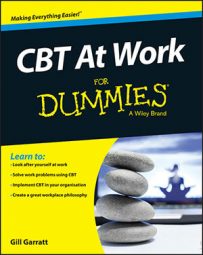James Davinport discovered cognitive behavioural therapy (CBT) after suffering burnout from his job. He shares his experiences here. These are his words:
A year ago my whole world collapsed. In hindsight, I can say that I should have seen it coming — the breakdown had been building up for years: month by month vestiges of myself were chipped away at, until finally, it felt like there was not really a 'me' there that I could recognise anymore. At work, in the lower eschelons of a high-powered business, I had driven myself down into the dust. I had worked seven days a week for years, often in to the early hours of the morning.
By the end, nothing on the computer screen in front of me made sense. I dreaded the regular presentations I had to make at work: I felt like each and every one I gave was a 'failure' (even though peer assessment I received indicated the opposite). I didn't want to see people, and I lashed out at family and friends. One evening, I found myself kicking a chair in the living room for no reason. Luckily, my lodger was not in the room at the time!
During the day, I would slip away from the office to cry in a nearby park. My head raced with negative thoughts, many of which were so irrational, that it was upsetting just to have them. Often, in my mind's eye, I'd see visions of myself crying out for help.
But it was the physical symptoms that made me finally shout 'stop': the dizziness, exhaustion, tender muscles that would suddenly seize up, the panic attacks, the inability to remember or concentrate, the heart palpitations, and digestive difficulties for months on end. My physical health suddenly seemed so vital, and was what finally forced me to reassess what I was doing.
So I did what seemed the unthinkable: I quit my job, gathered my savings, and set about recovering.
I had tried meditation for the first time a few months before my breakdown but was so anxious that, after each session of mindfulness meditation, I was closer to a panic attack than before it. (Later, I learned that this was brought on by a rather curious form of OCD, or Obsessive Compulsive Disorder, I had developed, called 'sensor motor OCD', which leads to high levels of anxiety as a result of paying attention to bodily sensations).
The present moment hardly seems a joyful place when your head is racing with negative thoughts and turbulent emotions. It became clear to me that 'accepting' these thoughts and feelings nonjudgmentally was not what I needed to do; I needed to change them.
Recovering with CBT
I'd long heard about CBT, or Cognitive Behavioural Therapy, but had never really considered it for myself. But early on in my determination to recover when I was idly browsing the shelves, I came across a Teach Yourself CBT Book. This was the best purchase of my life. I was determined to commit wholeheartedly to what the book taught me, building on each lesson bit by bit.
I have practised this particular technique ever since. I have come to love the challenge of doing it. It feels rather like 'gardening', as if challenging negative thoughts is like clearing out weeds. What I also like about this method is that it is not about replacing negative thoughts with 'positive thinking' for its own sake, but rather with balanced, more accurate thinking, which accepts nuanced understandings of situations.
It's a highly rewarding journey. But today, I can safely say that over the last few months the balance has tipped:
From being generally 'on edge' and feeling scared when out and about, I now love being out and about.
Whereas before, I would have quickly withdrawn into my shell in social situations and felt 'isolated', I now am confident when meeting new people, and tend to focus on the positives of each event afterward, not on a negative 'post mortem'.
Now that I'm working again, I don't drive myself nonstop. Now my self-worth is derived from the whole spectrum of my life, not just my work-related achievements. I can knock off without the slightest shred of guilt at not checking my email until nine the next morning.
Gone are the days of being fearful that I had several kinds of serious illness; such thoughts rarely cross my mind now. In fact, these days I laugh on the few occasions I have those thoughts.
The panic attacks have simply disappeared.
A year ago this all seemed impossible even to dream of. Now it seems hard to countenance the kind of fears I had a year ago: was that really me? Back then it seemed like the world was a harsh and horrible place. But, in fact the outside world has not changed — rather, my relationship to it has changed. And I have achieved it myself.
James Davinport is a pseudonym. He lives and works in London.

